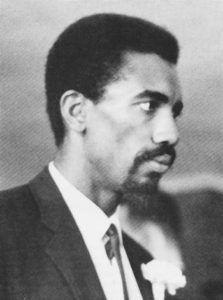
Henry Dumas
Henry Dumas was born on this date in 1934. He was a Black teacher and writer.
Born in Sweet Home, Arkansas. At age ten, he was taken to Harlem, where he attended public schools and graduated from Commerce High School in 1953. He claimed Moms Mabley and gospel music were particular influences on him.
He enrolled in City College that year but left to join the Air Force. Stationed at Lackland Air Force Base in San Antonio, TX, he maintained his interest in religion by teaching Sunday school. Dumas also spent a year on the Arabian Peninsula, where he became interested in the Arabic language, mythology, and culture.
Dumas married Loretta Ponton in September 1955; while he was still in the military, they had two sons. The first son, David, was born in 1958 after Dumas had completed his tour of duty and enrolled at Rutgers University. His second son, Michael, was born in 1962. Though he had compelling responsibilities as a husband, father, and IBM worker (1963-1964), Dumas was also active in civil rights and humanitarian activities, including transporting food and clothing to protesters living in Mississippi and Tennessee.
In 1967, Dumas attended Southern Illinois University as a teacher, counselor, and director of language workshops in its Experiment in Higher Education program. Here, he met Eugene Redmond, a fellow teacher in that program. Over the ten months, Dumas and Redmond forged a collaborative relationship in which they read their poetry at common gatherings; Redmond especially remembers Dumas reading "Our King Is Dead," his elegy for Martin Luther King Jr.
Dumas also frequented the offices of the East St. Louis Monitor. Dumas was closely associated with the Black Arts Movement of the 1960s, which championed an aesthetic grounding in Black cultural nationalism. But, in the words of Amiri Baraka, Dumas produced "a true art form, not twenty 'hate whiteys' and a benediction of sweaty artificial flame, but actual art, real, man, and stunning."
In April of 1968, at thirty-three, Dumas was shot and killed by a New York Transit Authority Policeman at 125th Street Station in a case of "mistaken identity." At his death, he had already finished several manuscripts of poetry and short stories. Dumas's poetry, short fiction, and novels have been published posthumously due to the efforts of Eugene Redmond, Toni Morrison, and Quincy Troupe. "Poetry for My People" first appeared in 1970 and was later published as "Play Ebony, Play Ivory."
When "Play Ebony, Play Ivory" appeared in 1974, Julius Lester, in the New York Times Book Review, called Dumas "the most original Afro-American poet of the sixties." Dumas's first collection of short fiction, "Arks of Bones and Other Stories," was first published in 1974.
Redmond also helped to bring out an unfinished novel, "Jonah and the Green Stone" (1976), as well as the collections "Rope of Wind and Other Stories "(1979), "Goodbye, Sweetwater" (1988), and "Knees of a Natural Man: The Selected Poetry of Henry Dumas" (1989).
Authors James Baldwin, Gwendolyn Brooks, and Maya Angelou have celebrated his writing for its mixture of natural and supernatural phenomena, music, beauty, and revolutionary politics.
The Oxford Companion to African American Literature. Copyright © 1997
by Oxford University Press.